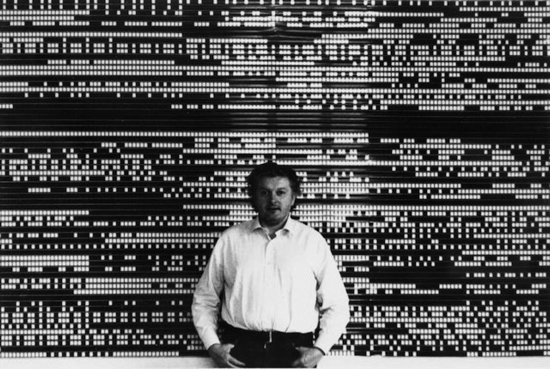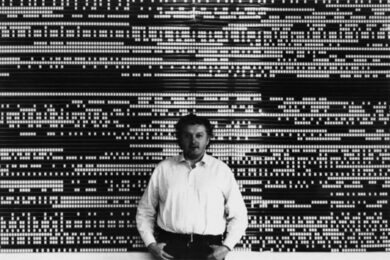Clocking in at 232 minutes, Martina Kudlácek’s portrait of graphic-cum-metric-cum-materialist filmmaker Peter Kubelka is roughly four times the length of the renowned artist’s entire output. The justification for this comes less, it seems, from a focus on Kubelka’s filmmaking, and rather from all those aspects that surround it. The Vienna native’s refined theories and experiences are given the space to breathe and flourish outside of his condensed, exacting and meticulously crafted celluloid strips.
Kubelka is perhaps to this day the most prolific theoretician within the avant-garde sphere since Stan Brakhage, and Kudlacek’s documentary is keen to demonstrate this, but in an inventive manner. A flawed trope in similar profiles is to tie any and all passions or speculations the subject may have back to their filmography (something that, for example, Jim Shedden’s 1998 Brakhage falls foul of). Kudlácek’s whimsical extended piece is refreshing in avoiding this common pitfall; Kubelka’s interests outside of filmmaking are given an independent weight and importance. An avid collector of Neolithic objects and materials, he guides us through various phases in the germination and use of tools and totems from this period. So rich, exhaustive and occasionally eccentric are these mini-lectures that one forgets ‘Kubelka the filmmaker’, becoming engrossed by the Austrian’s wealth of knowledge. By virtue of not consistently tying Kubelka’s extraneous theories and world views back to his cinema, Kudlácek manages to offer us an extremely intimate portrait – after nearly four hours it is difficult not to feel as though you have developed some kinship with the man.
This is not to say that Kubelka’s filmmaking does not feature. It does, and offers up some of the film’s more poignant and melancholic moments. In one sequence we see Kubelka at his Steenbeck pouring over a print of Unsere Afrikareise, his 1966 safari short. The detail of his explanations, this time focusing on the work’s structure and use of sound as a counterpoint to the visual track, transforms what initially appears as a ‘straighter’ doc among his output into something closely related to the other metric-structuralist pieces. Kubelka’s youthful passion and verve when discussing this film is amazingly convincing. He could almost give any breakdown of the work and you would buy it. Fragments of Kubelka manages to strike a rare and brilliant balance: avoiding the turn into an awestruck homage to its subject, while allowing him to be completely awe-inspiring throughout.



